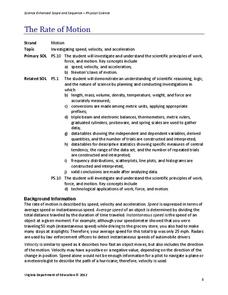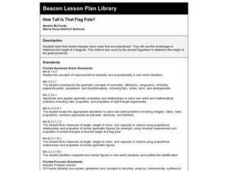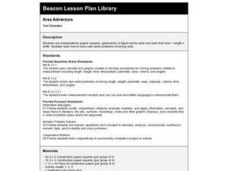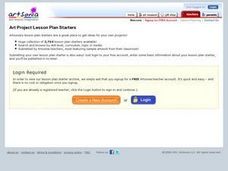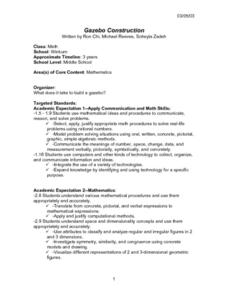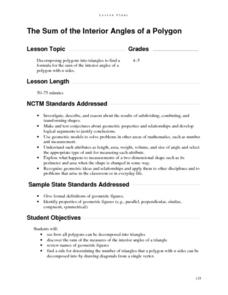Virginia Department of Education
The Rate of Motion
How much time does it take to jump over three balloons? Pupils calculate the speed of tasks that require different motions. They determine motions for tasks such as walking, skipping, hopping, and jumping before creating a...
Curated OER
Classroom Archaeology
Students, in groups, receive a box of artifacts. They record their findings and discuss what the items would have been used for. They come together at the end of the lesson to share their findings.
Virginia Department of Education
Heat and Thermal Energy Transfer
How does radiation affect our daily lives? Answer that question and others with a lesson that discusses radiation and its use in thermal energy transfer through electromagnetic waves. Pupils investigate vaporization and...
Virginia Department of Education
Work and Power
Assist your class with correctly calculating the values for force, work, and power as they determine the amount various activities require. They gather data and participate in a group discussion to compare results upon conclusion of the...
Virginia Department of Education
States and Forms of Energy
Energy is just energy, right? Explain various forms of energy to your young scientists by using an interactive experiment that contains common objects to demonstrate complex concepts. Pupils conduct experiments for radiant, thermal,...
Curated OER
Reflections
Fifth graders create a reflection of a poygon using a Mira. They discover that a line connecting a vertiex of a polygon and the corresponding vertex of its reflection is perpendicular to the line of reflection. Students create a glide...
Curated OER
How Tall Is That Flag Pole?
Pupils examine various triangles and discuss how similar triangles have sides that are proportional. They utilize an ancient Egyptian method to determine the height of a flagpole.
Curated OER
Area Adventure
Students calculate the area of figures using the formula: length x width = area. They solve area problems using paper squares, geoboards, and real-world problems.
Curated OER
Medieval Castles
Second graders design a scale model of a medieval castle and its surroundings including the following items: castle, moat, bailey, drawbridge, turrets, dungeon, grounds, and outer walls. A perfect lesson for those kids who are fascinated...
Curated OER
Marshland Wonders
Learners review the characteristics of wetlands and list their benefits. After viewing short videos, they identify the organims that make their home in wetlands and how they have adapted. They compare and contrast the characteristics...
Curated OER
Gazebo Construction
Students create and give oral proposals for the construction of a gazebo using a blueprint created with Geometer's Sketchpad. They then build a gazebo model using the blueprints created and provide evidence why it should be selected for...
Curated OER
Forces and Newton's Laws Unit
Students participate in lessons on Forces and Newton's Laws by selecting activities and assignments to complete in a Layer Unit. Students select assignments and activities in the C Level, B Level, and A Level.
Curated OER
Tick Around the Clock
Students examine and discuss the differences between clocks they are shown. Using the internet, they research how people used to tell time before clocks. They review what the long and short hand on the clock represent and practice...
Improving Measurement and Geometry in Elementary Schools
The Sum of the Interior Angles of a Polygon
Junior geometers discover that polygons can be decomposed into triangles and that the number of triangles can be determined by a rule. Note that the Geometer’s Sketchpad® software is required to carry out all components of this...
Curated OER
Is Your Money Rolling Away?
Young scholars demonstrate how to solve word problems. They will watch the video "Math Can Take You Places" and identify three problem solving strategies.
Curated OER
Minnesota-China Connections:What Time Is It?
Learners calculate the time difference between Beijing, China and their local community. They discuss how time difference affects intercultural communication.
Curated OER
Box and Whiskers
Middle schoolers discover how to relate collected data with a box and whiskers graph in a number of formats. They collect, organize, create, and interpret a box and whiskers graph. Pupils interpret the difference between sets of data,...
Curated OER
The Three States of Matter
Young scholars explore the three states of matter. In this physics lesson, students are shown examples of solids, liquids, and gases. Young scholars make cookies and identify the three states of matter during the baking process.
Curated OER
Rep Tiles
Third graders use pattern blocks of one shape at a time to try to create a similar shape. They compare the perimeter of the new figure with the perimeter of the original shape and look for a pattern. Students use the pattern to predict...
Curated OER
Density Challenge
Students calculate the densities of several liquids that appear similar. In this physical science instructional activity, students go beyond understanding the way liquids of different densities behave to researching how this...
Curated OER
Tomb Robbers
Sixth graders identify benchmark angles as they are embedded into a circle grid. They observe the teacher using an angle ruler and complete a Star Spangled worksheet, play the game Tomb Robbers, and as a class discuss their game winning...
Curated OER
Area: It's What's on the INSIDE That Counts!
Second graders participate in a series of hands-on, online and multimedia activities that examine the concept of area. They view clips from the animated series Math Monsters and discuss the purpose of area and how it is used in the real...
Curated OER
Making Benchmards--Length
Students explore the idea of having Benchmarks to estimate the length of given objects. Students demonstrate acquired knowledge of the basic units of length by making reasonable estimates. Students create a personal benchmark.
Curated OER
Scaling Our School
Fourth graders practice estimating the length and height of buildings at their school. They then compare their estimations with the actual heights or lengths. Each student then builds a scale model using ratio to translate the "real"...
